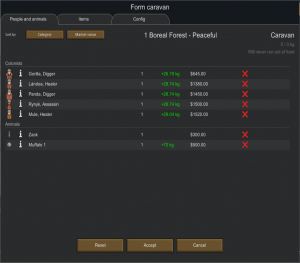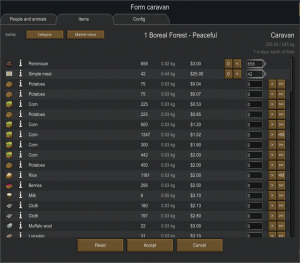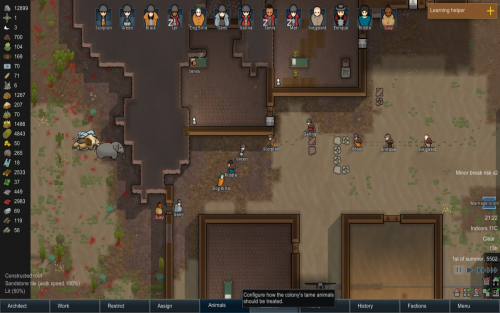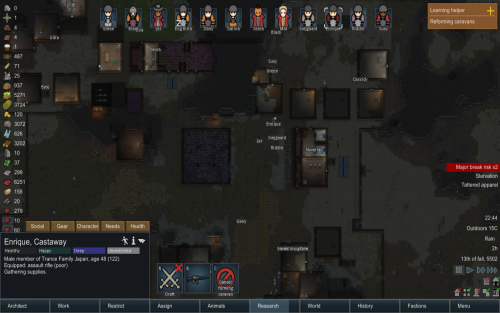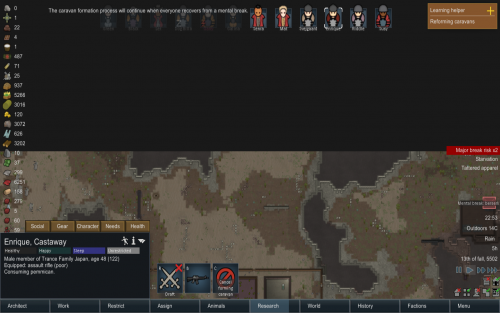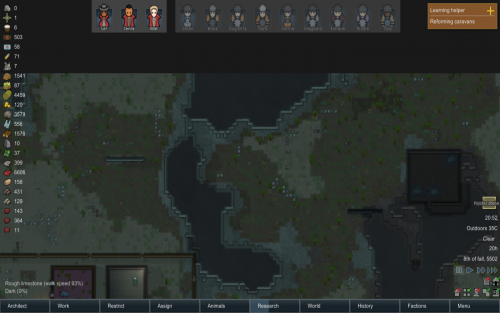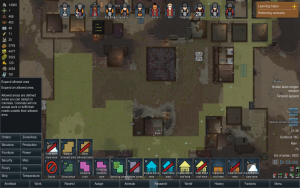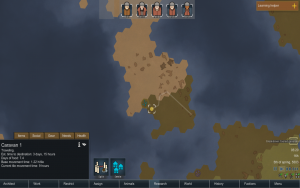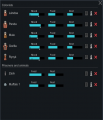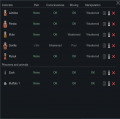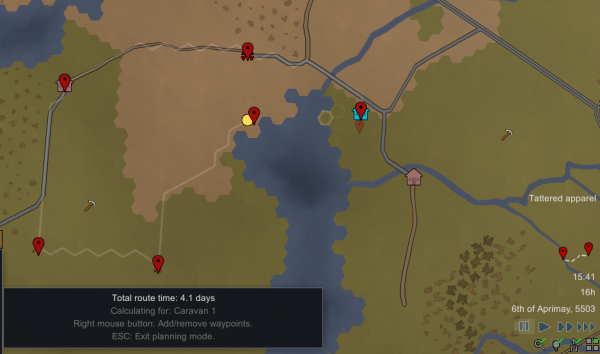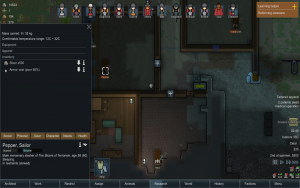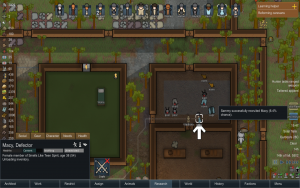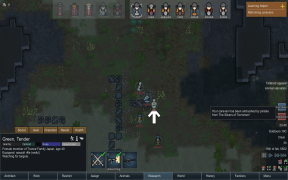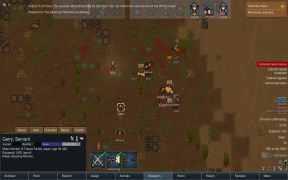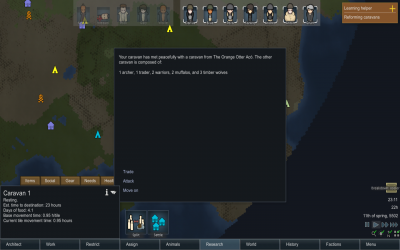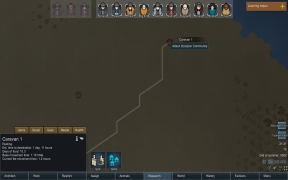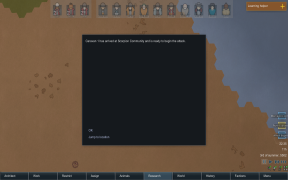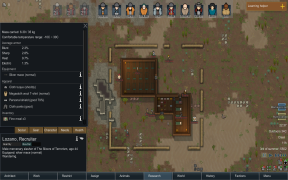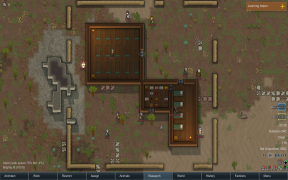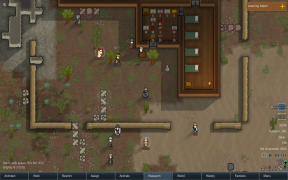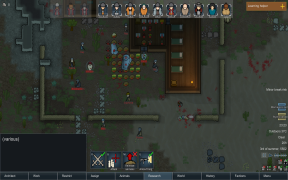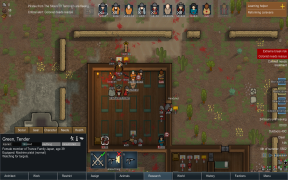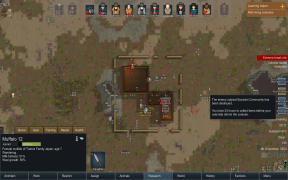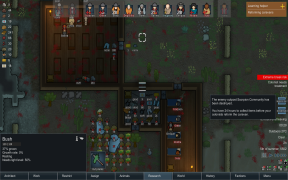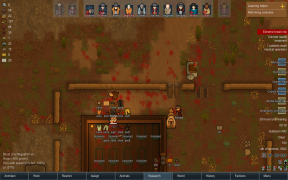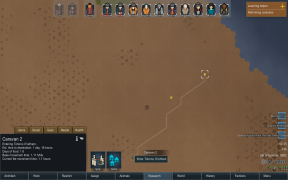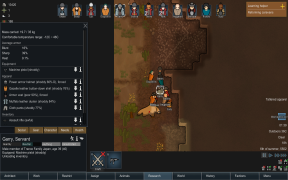Caravan
Caravans are a group of one or more colonists who gather together for two purposes: as goods transport carrying supplies on animals of burden and prisoners as well as a raid squad to attack other establishments. Each caravan is represented on the world map by a yellow icon. Double-clicking a caravan will select all caravans on the screen, allowing them all to be ordered to a single destination.
Sending caravans out from your home, instead of just waiting for other tribes to come to you, helps keep up fluid commerce. It provides a wider selection of goods since friendly outposts have much more inventory than the limited selection traders (who are restricted by carrying capacity) show up with, and you get a 2% price bonus for direct trading.
Creation
In the World map, select the colony icon and click 'Form caravan'. A dialog is shown to assign pawns, animals and items. You can create multiple caravans.
Caution: Clicking 'Abandon' on an unoccupied colony will not prompt for any confirmation before making it an inaccessible ruins and lost forever.
People and Animals
Choose the colonists who will take part of the convoy, the animals (e.g. dromedary or muffalo) that will carry the items for sale, and prisoners you want to transport. At least one colonist must be chosen. Make sure to select those whose health are in optimal conditions.
There are three different arrangements when forming caravans:
- A caravan without pack animals forms the fastest, as colonists only need to pack items on their backs and will leave quickly.
- Caravans with pack animals endure a loading phase where colonists must load the pack animals. This can take a long time if there are lots of materials or if the animals are far away from goods.
- Caravans already traveling through the globe will reform instantly and not require a hauling phase.
Incapacitated pawns cannot be chosen to be part of the caravan initiation process, but once your caravan is travelling you can pick up incapacitated people to come with you. They will slow down your caravan by a lot, so be warned.
Items
Use the Items tab to select supplies. Only items located in your Stockpiles or Home Area are shown while initially packing; when reforming rhe caravan you can select any item on the map.
Carrying capacity:
- Colonists/prisoners: 35 kilograms (kg). This capacity includes clothing, gear and inventory they already have.
- Muffalo: 73.5 kg
- Dromedary: 70 kg
- Alpaca: 35 kg
Baby animals have a reduced carrying capacity.
The combined carrying capacity and mass of selected items is listed at the top. Buttons are used to select items/amounts. A double arrow [>>] will take the full quantity of an item. The arrow [>M] indicates you cannot carry the full quantity, but it will automatically take the maximum amount. When over capacity, the arrow [M<] will return some or all of those items so that the mass total does not exceed the caravan's carrying capacity.
Since the dialog doesn't always account for gear that's already been loaded onto your pack animals, it's possible to end up loading too much weight and find your caravan becomes immobile as soon as it appears on the world map. You can avoid this by making sure your animals are unloaded before clicking the 'Form caravan' button.
If a caravan member dies in the close up view, they will drop their items which must be reloaded into the caravan. If they die on the global map (such as from blood loss), their gear will be lost. If all party members die, the entire caravan disappears and everything is lost.
Food
Caravans will feed as needed during the journey, so long as there's enough within the supply. The current game version doesn't allow players to harvest or hunt while traveling through map tiles, but herbivore animals can still eat grass from their surroundings, provided the ground isn't frozen over. However it is still possible to perform this action manually.
It's vital to bring sufficient food for the journey or travelers will starve to death from malnutrition. Estimate your food supply based on the roundtrip journey days or stop by every outpost along the way.
Food spoils without refrigeration so careful selection is needed:
- Simple meals will suffice for short journeys.
- Pemmican will be needed for mid-length travels.
- Packaged survival meala will be necessary for extremely long journeys.
Supplies that expire soonest will be consumed first.
While traveling, world map events may trigger such as manhunter packs, raids (or other traders crossing paths), which will generate mini-maps and after threats had been taken care of, it's possible to scavenge a bit of food and herbal medicine before the map closes down. It is likely that you will have some items scattered in the mini-map, these must be re-loaded to the caravan or they will be lost after the timer countdown. It's best if you reform the caravan through the tab rather micro-managing like within your colony.
Config
Use the Config tab to choose an exit direction. This determines which tile adjacent to your colony the caravan will appear on in the world map. If you forget this step, your caravan may require a little extra travel time due to starting from a sub-optimal location. It's possible to have no available exit direction, such as when on a single-tile island, thus a caravan cannot be launched.
Formation
Once the order to form the caravan is given, colonists will gather around a caravan packing spot or a random place within your home area and wait for any animals or other colonists to assemble. Afterwards, they will gather any needed supplies, preferring to put them on pack animals if available. When they finish, they will proceed to head out to the map edges and wait for the whole caravan to assemble. Afterwards, they will exit the colony map and enter the world map.
Colonists will ignore any needs during the formation, except food (once they're too hungry they'll take a break to eat, provided food is available on the map). With pack animals and large amount of resources, the colonists often take so long to gather supplies that they are prone to collapsing due to exhaustion and having mental breaks. They won't rest in their bedrooms but just sleep around the caravan packing spot.
They will also override the 'Forbid' command, and take items that are already forbidden.
Any mental break of its members will cause the process to be paused until that member recovers. Downing or killing that member will interrupt the process causing it to be cancelled.
A pawn in the process of forming a caravan can be temporarily interrupted by manually assigning them a different priority; they will resume loading activity once the interim task is complete.
Caravan formation time can be drastically reduced by placing the caravan packing spot near your warehouse.
Sometimes, even when the player has made a proper set-up, the caravan may fail to form as intended. There are two common behaviors that can be used to identify the problem:
- Party members just wander around in circles.
- Party member keeps repeatedly picking up and dropping a same item non-stop.
The reasons bugging the gathering can vary, but one common issue is that the assigned number of a certain item had been reduced. For example: the caravan was meant to carry 100 pemmican, but during the process, a non-caravan colonist ate some, preventing the requested quantity from being met.
If the formation was successful, the character roster on top of the screen will split those who stayed at home and those who left with the caravan by greying them on a different "box".
Caravan pathing
Once items have been loaded, party members will proceed separate ways according to their own classifications made by the player
Tricks
- To increase loading speed, select more colonists to start caravan formation. Once your caravan is ready split the extra colonists off into their own caravan then lead them back to your base, leaving only the original caravan members to proceed.
- The act of gathering supplies allows a colonist to carry huge stacks of light weight materials like cloth or food. This can be exploited to perform Super Hauling by having a colonist pick up all the goods on the map, drafting them into the storage room, and cancelling the caravan to unload. They will have hauled a massive number of supplies in one trip.
Travelling
Once your caravan enters the world map you can give it orders.
A caravan can:
- Move - Right-click to select destination. A line indicates the optimal route (accounting for terrain speed and elevation changes).
- Settle - Click Settle to create a new colony.
- You may not settle a new colony when already at maximum. The default maximum is one. This can increased to up to five in Menu - Options.
- Settling directly adjacent to your own colony or any other settlement is not allowed.
- Enter back into the colony - Right-click the colony.
- Split - Click the Split button. Each caravan must consist of at least one colonist.
- Merge - Select two or more caravans in the same tile (by dragging a square zone) and click Merge to form a single caravan.
- Trade - When a caravan has reached a friendly faction outpost, click the trade button to open the trade dialog window.
- Attack - A caravan can attack any faction outpost, regardless of relations status, though attacking will worsen relations.
Status box
Movement status:
- Traveling - moving to destination.
- Resting - caravan automatically stops between hours 22 and 6 to sleep.
- Waiting - no destination selected.
- Stopped - stopped moving with reason given.
Estimated time to destination - time to destination based on the current tile movement time.
Days of food - compare this to 'estimated time to destination' to determine if your caravan has enough food for the journey.
Movement speed is based on the average speed of all pawns, if all are capable of moving. Incapacitated colonists will seriously hamper your movement. Colonists are generally faster than pack animals, who are faster than pregnant animals, who are faster than prisoners, who are faster than juvenile and infant animals. Caravans usually travel slower in winter (except in hot areas without snow), and are faster on roads..
If inventory mass exceeds carrying capacity the caravan will become immobilized until the mass is reduced, such as by eating food, discarding goods or having another caravan join up to bring capacity above inventory mass.
Base movement time: Movement speed based on the average speed of all the pawns in the caravan.
Current tile movement time: Current movement speed based on the terrain, biome, weather (only affected during autumn-winter) or roads. (See table on this page for details.)
A caravan may stop for various reasons, such as when;
- Between hours 22 and 6 while the members sleep and rest.
- They still continue to rest even if all members are fully rested.
- All colonists are downed or having a minor/major mental break.
- Any member is having an extreme mental break.
- Nobody will be harmed even if the colonist is going berserk.
- Minor or major mental breaks won't stop the caravan, though if you settle/ get ambushed that colonist will remain in a broken state.
In Alpha 17, caravans enter/exit tiles when touching the boundary instead of the center.
Sustenance
Pawns travelling in a caravan will eat automatically when necessary. Grazing animals, when hungry in a place with grazable plants, will instantly have their hunger bar refilled without any cost. If not, they will proceed to eat food carried in the caravan. Pawns will prioritize food that spoils earlier.
If a colonist has an injury or disease that requires tending, doctors will tend to them as necessary, using medicine if available to them.
Movement Speed
Many things can affect the travelling speed of caravans. Clothing, armor, traits, and health conditions all affect a pawn's movement speed. A caravan's movement speed is determined by taking the average speed of all of the members of the caravan across colonists and animals into account, though the exact algorithm is unknown.
Some example of things that may slow you down:
- Clothing and armor (varies; e.g. Parkas and Power Armor have non-trivial movement penalties)
- Injured or downed colonists and prisoners
- Downed pawns can significantly slow down caravans, much more than injured ones that are capable of walking.
- Traits (e.g. Slowpoke)
- Slower animals, including muffalo, dromedaries or alpacas (the animals that can haul goods in caravans)
- Animals can be injured too. A muffalo missing a leg or two will slow down your caravan even more.
- Middle-stage pregnant animals move at 85% speed.
- Late-stage pregnant animals move at 70% speed.
- Juvenile animals move at 90% speed.
- Baby animals move at 50% speed.
Some things that can speed you up:
- Colonists equipped with Bionic legs or high on go-juice or yayo.
- Roads halve the time it takes to travel through a tile.
While the slower Muffalo and Dromedary speeds compared to the human base speed won't significantly affect shorter distances, baby animals and seriously injured colonists can have a significant impact, increasing travel time by 30% or more.
Movement Speed Table
The following table lists the base caravan movement speed in hours per tile for an unencumbered human. Flat terrain is naturally easiest to travel. Hills and mountains will worsen travel speed, while roads speed it up. Biomes with cold winters have reduced movement speed during the winter. It appears to be interpolated based on the current season and temperature with the worst case values listed in the table below.
Note that it is unlikely that your caravan will travel at the speed listed here.
| Terrain | Biome | Flat | Small Hills | Large Hills | Mountains |
|---|---|---|---|---|---|
| Easy | Arid Shrubland | 0.99 | 1.8 | 3.4 | 13 |
| Desert | 0.99 | 1.8 | 3.4 | 13 | |
| Extreme Desert | 0.99 | 1.8 | 3.4 | 13 | |
| Tundra (summer) | 0.99 | 1.8 | 3.4 | 13 | |
| Tundra (winter) | 17 | 18 | 19 | 28 | |
| Moderate | Boreal Forest (summer) | 1.6 | 2.4 | 4 | 14 |
| Boreal Forest (winter) | 17 | 18 | 19 | 28 | |
| Temperate Forest (summer) | 1.6 | 2.4 | 4 | 14 | |
| Temperate Forest (winter) | 11 | 12 | 13 | 23 | |
| Rough | Ice Sheet | 3 | 3.8 | 5.4 | 15 |
| Difficult | Tropical Rainforest | 5 | 5.8 | 7.4 | 17 |
| Sea Ice | 5 | -- | -- | -- |
Tabs
The inspection pane has tabs to manage the caravan and view details.
In the 'Gear' tab, by clicking the red X you can drop items and lose them forever. Dropping items may be necessary if the caravan becomes overburdened and unable to move.
You can also abandon colonists and prisoners in the 'Social' tab. Items carried by a dismissed pawn will be lost. Abandoning a caravan member will cause their friends and family to have sad thoughts, and if the colonist is unlikely to survive (such as low temperatures) there will be a more severe penalty. Colonists who survive may eventually make their way back to your colony, or return as part of an enemy raid or friendly caravan.
In the 'Gear' tab you can swap gear by dragging and dropping gear onto different colonists, or to and from the caravan inventory.
Once you arrive to the destination, just click the Trade icon to start negotiations.
![]()
Route planner
There is a route planner that allows you to roughly check the amount of time it takes to reack a destination, allowing you to plan ahead.
When it is opened, you can drop various waypoints around the world map. The game will calculate the time it takes for a 1 tile/h caravan to travel through the planned route. You can also place the starting point on an existing caravan to determine the time taken for a journey based on that caravan's speed.
Returning back home
After you arrive back to your colony, you will notice two details must be addressed before continuing the game.
- All bedrooms had become unassigned for those who left and you must re-assign them yourself or each character will enter any room randomly.
- Cargo animals may go straight to their animal bed or just wander around still with all your items inside their packing gear. If you happen to need something at the moment, you will have to make them drop it. You may want to restrict them to a roofed zone and wait for them to go there before doing this, so the dropped belongings won't deteriorate due to exposure. Or you can wait until night when they are sleeping inside a room. Pack animals who have been trained for Obedience can be assigned to follow their master, who can be drafted to storage areas and wait until the animals follow him/her too to drop the items as well.
- Prisoners will still be carrying your caravan items too, even armor and weaponry (as odd as it may be). They will not unload their inventory after returning to base unless directed to through the gear tab, and will start to unload only after being recruited.
Long distance journeys
Many basic technology options prove to be very helpful for long distance travel. Make frequent use of Campfires, Pemmican, Passive coolers and Crafting spots to resupply your caravans and keep healthy on the road, instead of one large ride. Take advantage by building settlements whenever you run low on food or resources. Generated maps can have forageable food and animals to hunt or even tame into the convoy. Colonists will also need time off to relax and restore their joy.
Multiple Colonies and Pitstops
The game options let you choose how many colonies (up to 5) you can have active on the globe at once. Temporary maps from events do not count towards this limit. In order to build beyond the game menu limits you must abandon an existing colony. Should you choose to make multiple settlements, it is not necessary to carry all your raw materials all the way from home base to a new spot. Lighten the load by carrying valuables such as silver, gold, drugs and then trading them with your new neighbors.
While travelling long distances consider bringing valuable items in place of necessary supplies, then bartering for them via trade.
Events
Caravan events take place on the road, which means that neither side will be engaging with the benefit of a base. The action takes place in the open and the player must take advantage on terrain features to defend themselves. Those who survive will have a 24 hours window to perform vital needs such as doctoring, resting and feeding as well as re-packing. Eliminated hostiles can be fed to your animals.
There are two different ways of re-packing: manually giving cargo animals the selected item to be carried or re-forming the caravan. The first alternative lets you make the most out of the area which may include mining, harvesting and cooking, while the last option will instantly leave the place. Either way, before the countdown timer ends, all items must be put to be carried or they will be lost once the time runs out.
Ambush
Your caravan has been ambushed by an enemy faction. Colonists cannot exit the map until the attackers are defeated (killed, downed, or fled). If all are killed, the caravan is considered destroyed and will disappear along with any carried items.
1.- You have two maps to check, one is where your colony is in normal view and also the World view. The game will notify you when an Ambush is taking place so that you can check on your caravan.
2.- Pause the game to see the enemy information and position yourself by taking cover from terrain features, you are not in your base.
3.- World view red dot to check where is happening, as it is in this case, right next to the colony, its possible to send reinforcements. However, you cannot send the back-up caravan right into the battle but first to an adjacent tile and then join immediately your comrades.
4.- After defeating most of them, the remaining few will flee. A 24 hours count down triggers so you can recover, pick up items, strip the dead/downed and any other need.
5.- To take prisoners, you must build the smallest room possible (remember you are on a coundown) which can just bit the same amount of sleeping spots for each downed enemy. Treat their wounds so they don't die while carrying them to your colony. And finally reforming the caravan will take your captives (you will see them listed).
6.- Your prisoners are finally brought to your colony BUT you see them wandering around (!!!), don't worry they won't attempt to escape. Your characters will proceed to unload their items normally and depending on your cargo, they may finish fast or not. Eventually, those assigned as Wardens will come to pick them up and escort them to designated prison cells. Any prisoner who has been incapacitated by fights and are unable to move due to injuries like broken spines will remain downed but in no danger of death.
Demand
Pirates approach your caravan and demand that you give them items and hand over members as slaves. If you don't they will proceed to assault the caravan.
You can see the number of pirates when they are demanding you hand over items.
Encounter
Occasionally another caravan may cross your path giving you an opportunity to trade; or attack them if you wish. You will be informed of their party composition but cannot clearly see who is in the caravan, you can decide if they're too strong for you to cope with or not. If you attack them you'll damage relations. Your pawns may exit the map while engaging the caravan.
Sometimes when attacking them, they may decide to do a 'bloody exit', that is to exit as aggressively as possible.
Manhunter Ambush
Similar to Ambush except with a manhunter pack. The manhunters won't attempt to flee when outnumbered, and colonists can't flee, either.
Attacking other settlements
Attack their settlement, break into the storage room, steal the goods, take prisoners and leave. Such maps have considerable amounts of extractable resources and their base are notable for their bank of glitterworld medicine (a highly prized item), luciferium and food.
Settlement defenders as of later updates are significantly strengthened. They may pose a challenge to defeat, even with well-armed assault caravans.
Walkthrough
- Right click to select destination gives approximate travel time and distance.
- Once your caravan arrives, the game generates a map with an enemy base.
- The "Attack begun" blue envelope opens a message which allows you to see the targeted area.
- You can click on individual enemy members to see their character skills, gear and health. This is a good moment to start prioritizing your targets, you will find hostiles holding Personal shield, Assault rifles and so on but, those with such rifles have zero points in Shooting, so they are not a threat as they will miss most of their shots, especially from a distance.
- Base layout, nothing tricky.
Note: in Alpha 17 bases have a new design that can include rudimentary power and turrets..
- Enemy base is very simple, nothing too elaborated.
- Approaching from the front gate will make enemies line up facing you right away automatically.
- Stampede offense tactic to "lighten" their defenses. Train your offensive animals for "Release" command but not those meant to until carry merchandise.
- Stampede casualty with animal wounds.
- Tactics split and kite allows you to enter their base and use choke points like Defense tactics, using friendly fire safety method. Melee with ranged shooting on his/her shoulder.
- After 8 of 11 enemies were killed, the remaining 3 start to flee and the game considers the outpost destroyed and a 24 hours countdown timer begins to treat your wounded, loot and rest. You don't need to destroy the base once you captured their base, just claim their doors and they will open as if they were yours from the beginning.
- Since they had two rooms, one can be used as an infirmary and the other as a prison to handle your prisoners to enslave.
- You can strip all your killed or downed enemies to take their weapons and armor, items that you cannot manufacture at home such as the shield and armor/helmets. Be careful with the deadman's apparel mood penalty if you took them off the dead, though.
- Once those 24 hours had passed, the game automatically kicks you back to World map at which point you can return home and/or visit friendly outposts as well. If you want you can also choose 'Reform Caravan' which allows you to choose what you want to bring, and leave early.
- Once you arrive back home, characters will start "Unloading their inventory", which is the inverted process of creating a caravan. They will sort items properly.
- Problem to you or maybe not, the work tab order will shift to a different sequence than the original before leaving.
